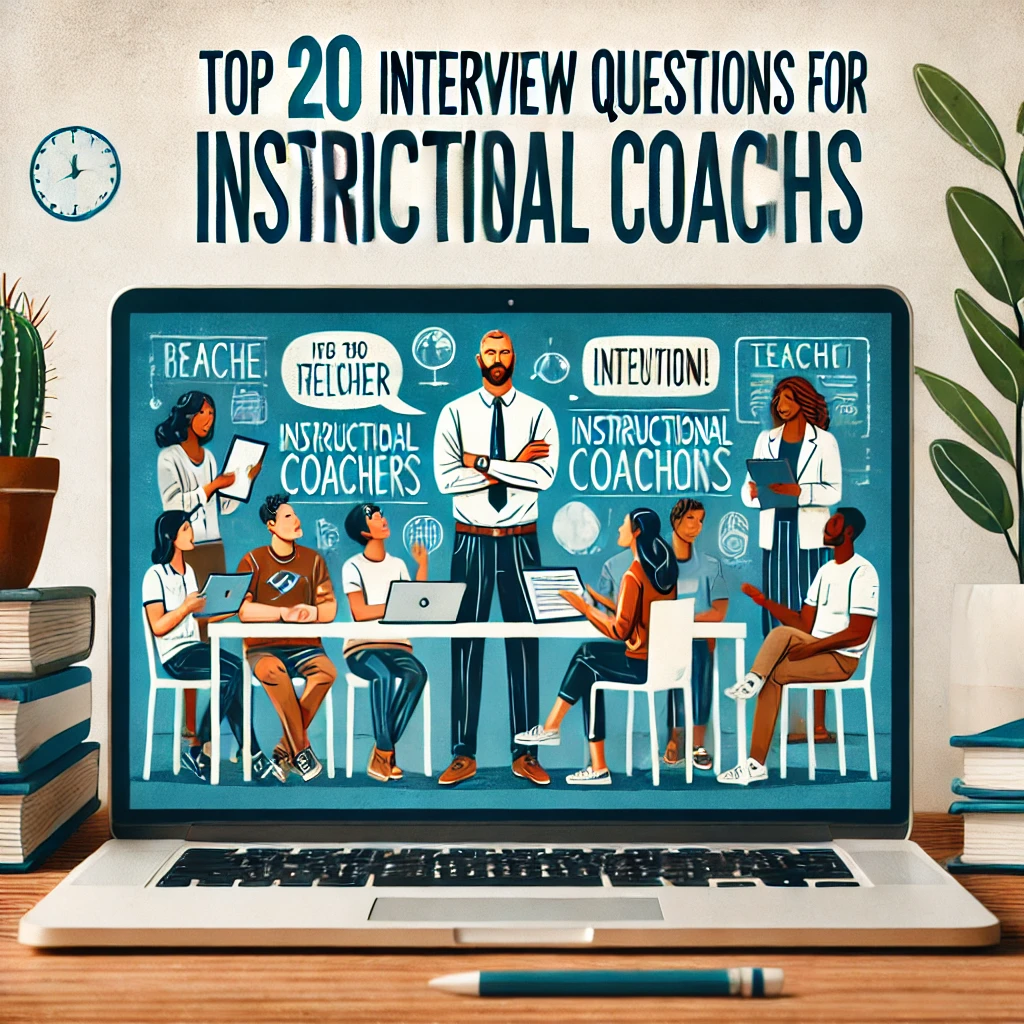General Background and Philosophy
1. Can you tell us about your background and experience as an educator?
Sample Answer:
“I have been an educator for [X years], teaching [specific subjects/grades]. During this time, I focused on implementing student-centered learning and data-driven instruction, which laid a strong foundation for my interest in instructional coaching. I also led professional development sessions for my colleagues, where I honed my coaching skills.”
2. What is your philosophy of instructional coaching?
Sample Answer:
“I believe instructional coaching is a partnership. My role is to support teachers in refining their practice through collaboration, goal-setting, and reflective dialogue. The ultimate aim is to enhance student learning by empowering teachers.”
Role-Specific Skills and Strategies
3.How do you build trust with teachers?
Sample Answer:
“I prioritize building strong relationships by listening, showing empathy, and maintaining confidentiality. I also celebrate teachers’ successes and approach challenges collaboratively, creating a safe environment for growth.”
4. How do you identify the instructional needs of teachers?
Sample Answer:
“I start by reviewing student data, conducting classroom observations, and holding conversations with teachers. Together, we identify areas for improvement and create a personalized coaching plan.”
5. What strategies do you use to model effective teaching practices?
Sample Answer:
“I believe in co-teaching, demonstrating lessons, and providing hands-on activities. Before modeling, I collaborate with the teacher to align the demonstration with their goals and follow up with a reflection session.”
Collaboration and Communication
6. How do you handle resistance from teachers?
Sample Answer:
“I address resistance with empathy and open communication. I strive to understand their concerns and frame coaching as a supportive process rather than an evaluative one. Building trust and showing the value of collaboration often alleviates resistance.”
7. How do you ensure teachers feel supported without being overwhelmed?
Sample Answer:
“I work with teachers to set manageable, achievable goals. Regular check-ins help monitor progress, and I provide resources and encouragement to ensure the workload feels manageable.”
Instructional Practices
8. How do you incorporate data into your coaching?
Sample Answer:
“I guide teachers in analyzing student performance data to identify trends, gaps, and strengths. Together, we design strategies and interventions that are informed by this data, ensuring our efforts are targeted and effective.”
9. What is your experience with differentiated instruction?
Sample Answer:
“As a teacher, I routinely used differentiated strategies, such as tiered assignments and small-group instruction. In coaching, I help teachers adapt these practices to meet the diverse needs of their students.”
Professional Development
10. How do you design and facilitate professional development sessions?
Sample Answer:
“I identify teachers’ needs through surveys, observations, and feedback. My sessions are interactive, with a balance of theory and practical application, ensuring teachers leave with strategies they can immediately implement.”
11. What steps do you take to ensure ongoing teacher learning?
Sample Answer:
“I encourage reflective practices, provide follow-up coaching, and create learning communities where teachers can share ideas and resources.”
Conflict and Problem-Solving
12. How do you handle disagreements with teachers about instructional methods?
Sample Answer:
“I approach disagreements with an open mind, respecting teachers’ expertise. I share evidence-based practices and invite dialogue to find common ground that benefits students.”
13. Can you describe a time when you helped a struggling teacher improve their practice?
Sample Answer:
“A teacher I coached was struggling with classroom management. I observed their class, provided actionable feedback, and modeled strategies for maintaining engagement. Over time, their classroom environment transformed, leading to improved student outcomes.”
Leadership and Vision
14. What role does leadership play in your coaching approach?
Sample Answer:
“Leadership is central to coaching. I lead by example, inspire teachers with a shared vision for student success, and foster a culture of continuous improvement.”
15. How do you align your coaching with school or district goals?
Sample Answer:
“I ensure coaching aligns with broader goals by collaborating with administrators, participating in leadership meetings, and tailoring coaching plans to support strategic objectives.”
Technology and Innovation
16. What is your experience with integrating technology into instruction?
Sample Answer:
“I have guided teachers in using tools like Google Classroom, interactive whiteboards, and assessment software. I focus on using technology to enhance engagement and learning rather than as a gimmick.”
17. How do you stay current with educational trends and research?
Sample Answer:
“I attend conferences, subscribe to professional journals, and participate in online communities for educators. Continuous learning allows me to provide relevant, evidence-based support to teachers.”
Evaluation and Reflection
18.How do you measure the success of your coaching efforts?
Sample Answer:
“I use multiple metrics, including teacher feedback, classroom observation data, and improvements in student outcomes. Reflection sessions with teachers also provide insights into what is working and what needs adjustment.”
19. What would you do in your first 90 days as an instructional coach?
Sample Answer:
“I would focus on building relationships, learning about the school culture, and conducting a needs assessment. Collaborating with teachers and administrators, I’d develop a strategic plan for the year.”
Wrap-Up
20. Why do you want to be an instructional coach?
Sample Answer:
“I am passionate about supporting teachers because I believe they are the key to student success. Instructional coaching allows me to share my expertise, foster collaboration, and make a meaningful impact on education.

